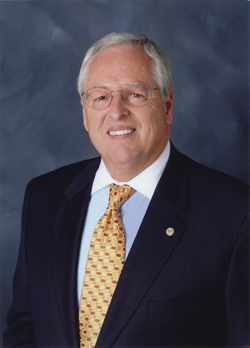
Kansas auto dealer Dale Willey says General Motors Corp. filing for bankruptcy today is long overdue. “Like it or not, everyone knew it had to happen.”
But Michigan GM dealer Russ Shelton says the shock of it hasn’t sunk in yet.
“I’m one of those people who didn’t think it would happen,” says Shelton, owner of Shelton Pontiac Buick GMC in Rochester Hills, MI. “Right up until last night, I was hoping for a breakthrough.”
Everybody was braced for it, so it was hardly shocking news, says Mark Schienberg, president of the New York Auto Dealers Assn. “But it is still shocking to hear ‘GM in bankruptcy.’”
John McEleney, chairman of the National Automobile Dealers Assn., agrees.
Even though it was anticipated for some time now, the bankruptcy filing “still marks a historically sad day for American business,” he says. “Obviously, this was not a preferred option. But the key now is to get out of bankruptcy as quickly as possible.”
Despite varied reactions, interviewed GM dealers express a conviction the auto maker will come out of bankruptcy stronger and trimmed down to a fighting weight.
“You’ve got to be an eternal optimist in this business,” says Mark Scarpelli, president of Raymond Chevrolet in Antioch, IL. “I’m looking forward to the reinvention of General Motors. I’m thrilled to be a GM dealer.”
It certainly hasn’t been boring being one in recent times. Although bankruptcy is unprecedented for the 100-year-old auto maker, GM in trouble is hardly new, and dealers on the front line have become battle-tough veterans.

“We’ve been through oil embargoes, 22% interest rates and long strikes,” Shelton says, reviewing unpleasantness dating to the 1970s. “We know how to adjust and we are pretty well trained. But you don’t go to boot camp for that. You live it.”
Willey recalls opening his GM-brand dealership in Lawrence, KS, 39 years ago, coincidentally on the same day of what became a 100-day United Auto Workers strike against GM. The labor dispute stopped vehicle production.
“It got so bad that, at one point, I was down to one used-car on the lot,” Willey recalls.
Now, he reflects on being a GM dealer all these years. “Some days, you wonder why you are so loyal to this company,” he says. “But I don’t sell other brands, and GM hasn’t really let me down yet.”
One first order of business for GM dealers is to quell the potential anxieties of customers worried about buying a product made by an auto maker in bankruptcy court.
“If I can get past customer fears, I’ll be fine,” says John LaSorsa, president of LaSorsa Buick Pontiac Chevrolet in New York City. “Incentive programs and government-backed guarantees will help there.”
The country has always believed in GM, says Tim Fisher, finance director at Ferrario Auto Center, a GM-Chrysler brand dealership in Towanda, PA. “I know they will produce, build and deliver a lineup for today’s standards. The smart customers know this and will remain loyal.”
Some customers are “as uptight as we dealers are,” says Shelton. “But it helps that Chrysler (LLC) went into bankruptcy last month and seems to be moving in the right direction. I’ve talked to Chrysler dealers who say they are still selling cars. That’s what I want to do, get back to selling cars.”
Yet Schienberg says the “$64 billion question” is whether GM can experience bankruptcy without losing sales.
“The question is whether Toyota (Motor Corp.), Honda (Motor Co. Ltd.) and others get a chance to gobble up more market share,” he says. “GM’s is at 19% now. If it goes lower, it’s going to be tough to get out of this.”
As part of its government-ordered reorganization, GM is reducing its dealership ranks by the thousands.
Schienberg sees that as a mistake, wondering how an auto maker increases sales by reducing sales outlets. “How does having fewer dealers make you stronger?”
Scarpelli says surviving dealers, such as himself, “will have some real opportunities.”
GM had advantages by being big, he says. “But there were disadvantages, too, such as a slowness to respond to market tastes, needs and wants.”
A GM field representative before becoming a dealer, Scarpelli says the auto maker “is an institution that needed to be recalibrated.”
If GM comes out of bankruptcy leaner, some dealers say it might emerge meaner, too, putting strident demands on retailers.
“I think the bar will be raised, and that may put some people outside of their comfort zone,” Willey says. “But it is an opportunity for dealers to step up to a higher level.”
GM-dealer relations “will probably be a bit better” post-bankruptcy because the surviving dealers will be the ones with strong sales and good customer satisfaction scores, LaSorsa says.
“These are the guys that know what they are doing,” he says. “You’ll see GM doing less letter writing to dealers it’s unhappy with.”
Still, dealer associations plan to be on guard against an auto maker that expects too much from its dealers, from unreasonable exclusivity expectations to costly demands to spend millions of dollars on facility upgrades, Schienberg says.
“No doubt GM will try to be tougher on its dealers,” he says. “But business problems start at corporate headquarters, not at dealerships.”




